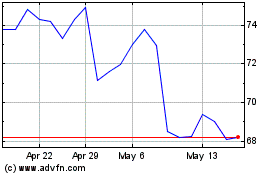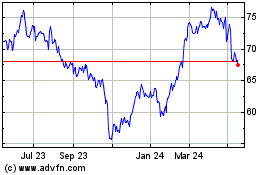- Important milestone towards “Ambition 2039”: Swedish
start-up H2 Green Steel (H2GS) to supply approx. 50,000 tonnes of
almost CO₂-free steel per year, to be launched in various
Mercedes-Benz vehicle models
- “Local for local” approach: Mercedes-Benz and H2GS
further agreed on extending their partnership with a joint ambition
to establish a sustainable steel supply chain in North America
- Sustainable steel supply chain: Mercedes-Benz plans to
decarbonize its steel supply chain with various partners
worldwide
Mercedes-Benz signed a supply agreement with Swedish start-up H2
Green Steel (H2GS) over approximately 50,000 tonnes almost CO₂-free
steel per year for its European press shops and deepened its
partnership through a Memorandum of Understanding (MoU) with the
aim to establish a sustainable steel supply chain in North
America.
After taking an equity stake in H2GS in 2021, the new supply
agreement enables Mercedes-Benz to bring almost CO₂-free steel into
series production. The partner plans to start its production during
2025.
As part of a broader effort to decarbonize the supply chain,
Mercedes-Benz and H2GS agreed to aim to establish a supply chain
for green steel produced in North America for local Mercedes-Benz
manufacturing plants. Extending the strategic partnership with H2GS
to North America marks another important milestone in increasingly
pursuing the strategy of procuring close to Mercedes-Benz
production sites.
“With the supply deal of around 50,000 tonnes
almost CO₂-free steel from H2 Green Steel for our manufacturing
plants in Europe, Mercedes-Benz and H2 Green Steel are accelerating
the creation of a decarbonized, regional and resilient steel supply
chain. At the same time, we are taking our partnership to the next
level with the aim of establishing a sustainable steel supply chain
in North America, another important step towards making the auto
industry more resilient and sustainable.”
Markus Schäfer, Member of the Board of
Management of Mercedes-Benz Group AG. Chief Technology Officer,
Development & Procurement
“Together with our strategic partner H2 Green
Steel we’ve achieved the next milestone of our local for local
strategy in procurement. Based on our initial investment into H2
Green Steel we now have a finalized relevant supply agreement for
Europe and are looking at establishing a sustainable steel supply
with H2 Green Steel in North America.”
Dr. Gunnar Güthenke, Head of Procurement and
Supplier Quality, Mercedes-Benz Cars
Almost CO₂ free manufacturing technology
By using a new, innovative manufacturing process, the production
of steel at the H2GS production site is almost CO₂-free. By
contrast, steel produced using a classic blast furnace, emits an
average of more than two tons of CO₂ per ton. In the new process,
the supplier uses hydrogen and electricity from 100% renewable
energy sources instead of coking coal in steel production. The
hydrogen serves as a reduction gas, which releases and binds the
oxygen from the iron ore. Unlike the use of coking coal, this does
not produce CO₂, but water vapor. H2GS aims to achieve a footprint
of 0.4t CO₂ per ton of steel at start of supply.
“H2 Green Steel exists because pioneering
companies in the automotive industry, like Mercedes-Benz, signaled
the transition in the steel industry was too slow for them to meet
their climate targets. Working side-by-side with Mercedes Benz, we
have a partner with whom we can raise the bar when it comes to
supply chain emissions, circularity and social sustainability. They
are a very strong player to liaise with for our European
operations, but naturally also as we endeavor into the steel value
chain in North America.”
Henrik Henriksson, CEO, H2 Green Steel
Decarbonizing the supply chain
Mercedes-Benz is working with all its suppliers towards a
net-carbon neutral supply chain from 2039 at the latest. To achieve
its ambitious climate goals the luxury carmaker is retooling its
supply chain to focus on the prevention and reduction of CO₂
emissions rather than off-setting. Already today, the brand with
the three-pointed star has introduced low-CO₂ steel, made from
scrap, into four series models. This allows CO₂ emissions for the
respective steel grades to be cut by more than 60%. Moreover,
Mercedes-Benz recently announced to bring aluminium with almost 70%
CO₂-reduction compared with the European average into series
production as the lightweight material is becoming increasingly
important for electric vehicles. At the same time, Mercedes-Benz
aims to increase the share of secondary raw materials in its
passenger car fleet to an average of 40%. Mercedes-Benz and H2GS
agreed to collaborate on levers to increase the scrap content
accordingly.
Actively pursuing a responsible and sustainable supply
chain
In addition to consequently reducing CO₂ emissions, the company
is committed to a responsible steel supply, relying on the
application of recognized standards and robust certificates.
Mercedes-Benz and H2GS share the same understanding of
sustainability and intend to establish highest standards in terms
of human rights due diligence along the steel supply chain.
Mercedes-Benz is a member of the Responsible Steel Initiative and
is actively involved in the development of a certifiable
sustainability standard for the steel industry. The aim is to
ensure environmentally compatible and socially acceptable steel
production along the entire value chain.
About Mercedes-Benz
Mercedes-Benz has set itself the target of making its fleet of
new vehicles net carbon-neutral over the vehicles’ entire life
cycle by 2039. When it comes to sustainability, the company is
focused on the consistent reduction of CO₂ emissions as well as the
preservation of resources. In 2020, Mercedes-Benz Cars and
Mercedes-Benz Vans sent out an ambition letter to suppliers of
production materials. This was a declaration of intent on the
supply of net carbon-neutral products and established prior
approval as a prerequisite for awarding contracts. Suppliers
representing almost 90% of Mercedes-Benz's annual purchasing volume
have already signed the letter, among them many steel
suppliers.
The vehicle manufacturer’s “Design for Environment” approach
takes resource preservation from the very earliest stages of
product development into account. Together with its partners,
Mercedes-Benz is researching more sustainable material technologies
and working intensively towards circularity.
About H2 Green Steel
H2 Green Steel (H2GS AB) was founded in 2020 with the ambition
to accelerate the decarbonization of the steel industry, using
green hydrogen. Steel, which is one of the world’s largest carbon
dioxide emitters, is the company’s first business vertical. The
founder and largest shareholder of H2 Green Steel is Vargas, which
is also co-founder and one of the larger shareholders in Swedish
battery maker Northvolt. H2 Green Steel is headquartered in
Stockholm, Sweden, with its first green steel plant under
development in Boden, northern Sweden. www.h2greensteel.com
Further information about Mercedes-Benz is available at
www.mercedes-benz.com. Press information and digital services for
journalists and multipliers can be found on our Mercedes me media
online platform at media.mercedes-benz.com as well as on our
Mercedes-Benz media site at group-media.mercedes-benz.com. Learn
more about current topics and events related to Mercedes-Benz Cars
& Vans on our @MB_Press Twitter channel at
www.twitter.com/MB_Press.
Mercedes-Benz AG at a glance
Mercedes-Benz AG is part of the Mercedes-Benz Group AG with a
total of around 170,000 employees worldwide and is responsible for
the global business of Mercedes-Benz Cars and Mercedes-Benz Vans.
Ola Källenius is Chairman of the Board of Management of
Mercedes-Benz AG. The company focuses on the development,
production and sales of passenger cars, vans and vehicle-related
services. Furthermore, the company aspires to be the leader in the
fields of electric mobility and vehicle software. The product
portfolio comprises the Mercedes-Benz brand with the brands of
MercedesAMG, MercedesMaybach, MercedesEQ, GClass as well as
products of the smart brand. The Mercedes me brand offers access to
the digital services from Mercedes-Benz. Mercedes-Benz AG is one of
the world's largest manufacturers of luxury passenger cars. In 2022
it sold around two million passenger cars and 415,300 vans. In its
two business segments, Mercedes-Benz AG is continually expanding
its worldwide production network with around 35 production sites on
four continents, while gearing itself to meet the requirements of
electric mobility. At the same time, the company is constructing
and extending its global battery production network on three
continents. As sustainability is the guiding principle of the
Mercedes-Benz strategy and for the company itself, this means
creating lasting value for all stakeholders: for customers,
employees, investors, business partners and society as a whole. The
basis for this is the sustainable business strategy of the
Mercedes-Benz Group. The company thus takes responsibility for the
economic, ecological and social effects of its business activities
and looks at the entire value chain.
View source
version on businesswire.com: https://www.businesswire.com/news/home/20230607005531/en/
Pia Droldner, phone: +49 (0) 176 30988043,
pia.droldner@mercedes-benz.com Aline Meiser, phone: +49 (0) 176
30900064, aline.meiser@mercedes-benz.com Andrea Berg, phone: +01
(0) 917 6672391, andrea.a.berg@mercedes-benz.com
MercedesBenz (TG:MBG)
Historical Stock Chart
From Dec 2024 to Jan 2025

MercedesBenz (TG:MBG)
Historical Stock Chart
From Jan 2024 to Jan 2025
